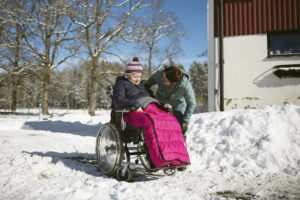Mireille Rogers, LPN, has been named National Caregiver of the Year by Maxim Healthcare Services, a provider of home healthcare, behavioral care, healthcare staffing, personal caregiving, and population health and wellness solutions. The Dighton, Massachusetts, resident was recognized for her steadfast commitment to high-acuity patients for the past five years during an awards ceremony in Baltimore, Maryland, on Sept. 18.
Rogers contends she was inspired to go into the medical field after witnessing firsthand the impact nurses had on her family when her grandfather was at the end of his life. Little did she know that by choosing this path she would ultimately change another family’s life forever.
When Jocelyn Van Wart was brought home from the hospital in 2016, her parents were overwhelmed by the task of caring for a medically-fragile infant with an uncertain future. Her genetic anomalies left her completely dependent on others to perform activities of daily living and put her at risk for sudden complications, such as seizures. Her parents were relieved to learn they were matched with a nurse who could assist in caring for their newborn daughter.
After their initial visit, both Rogers and the Van Warts formed an instant connection and two years later, they had achieved a happy routine with Jocelyn’s care. Everything came crashing down when their daughter suddenly went into cardiac-pulmonary arrest. In the face of overwhelming fear, Rogers sprang into motion, providing CPR and calling 911, effectively saving the young girl’s life.
Upon receiving her award for National Caregiver of the Year, Rogers thought of her patient back home and said, “I’m so thankful for my patients loving me as much as I love them.”
A panel of judges selected Rogers and three other regional winners from hundreds of nominations across the country. Now in its eighth year, the Caregiver of the Year Award program celebrates nurses and home healthcare aides for the key roles they play in delivering quality, patient-centered care to some of the nation’s most medically fragile and chronically ill patients.


